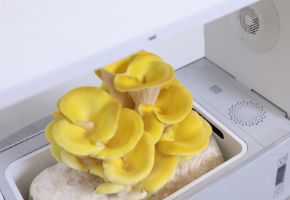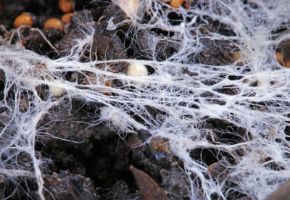In this article, we will delve into the role of Trametes versicolor, also known as Coriolus versicolor, in supporting cancer patients during chemotherapy. Through a detailed analysis of scientific research, active components, and mechanisms of action, we will explore how this medicinal mushroom can represent a valuable complementary support in the complex journey of anti-tumor therapy.
Trametes versicolor, commonly known as "Turkey Tail" due to its characteristic concentric bands of multicolored hues, is a wood-decay fungus widely distributed throughout the world. Belonging to the Polyporaceae family, this basidiomycete grows on dead or dying tree trunks, playing a crucial role in the wood decomposition process. Its importance in the medical field, however, extends far beyond its ecological role, positioning it as one of the most studied medicinal mushrooms in integrative oncology research. Trametes versicolor has a thin, leathery cap, typically fan-shaped, with sizes ranging from 2 to 8 centimeters in diameter. The upper surface is characterized by concentric bands of variable colors ranging from brown to gray, blue, green, and black, with a thin and often wavy margin. The underside of the cap shows white or cream pores, very small and numerous. The mushroom lacks a stem or has a rudimentary one, and the flesh is thin and leathery. Its identification is relatively straightforward for experienced foragers, but it is always advisable to consult a mycologist before consumption, given the presence of similar inedible species. Trametes versicolor is a cosmopolitan fungus, present on all continents except Antarctica. In Europe, it is common in all deciduous forests, while in Italy, it is widespread in all regions, from the Alps to the islands. It grows on dead or dying logs of numerous tree species, particularly oaks, beeches, birches, and willows, actively contributing to the wood decomposition process (lignin and cellulose). Its presence is indicative of mature and well-preserved forest ecosystems, where it plays a fundamental ecological role in nutrient recycling. Trametes versicolor owes its medicinal properties to a complex mixture of bioactive compounds, including polysaccharides, glycoproteins, triterpenoids, and phenols. The components most studied for their immunomodulatory and antitumor properties are undoubtedly the polysaccharides, particularly Polysaccharide-K (PSK) and Polysaccharide-Peptide (PSP), extracted from the mycelium and fruiting body of the mushroom, respectively. These compounds represent the core of scientific research on the therapeutic potential of Trametes versicolor in oncology. PSK, commercially known as Krestin, is a proteoglycan complex extracted from the mycelium of Trametes versicolor, composed mainly of β-glucans with (1→4) and (1→6) linkages, associated with a protein fraction of about 25-38%. Numerous clinical studies have demonstrated its ability to modulate the immune response, activating various populations of immune cells such as macrophages, natural killer (NK) cells, and cytotoxic T lymphocytes. The activation of these cells represents a crucial mechanism through which PSK exerts its antitumor effects and provides support during chemotherapy. PSP is another proteoglycan extract from Trametes versicolor, structurally similar to PSK but with some differences in amino acid composition and carbohydrate profile. In vitro and in vivo studies have shown that PSP possesses immunostimulatory properties, inducing the production of cytokines such as interleukin-2 (IL-2) and interferon-gamma (IFN-γ), which play a fundamental role in regulating the antitumor immune response. Furthermore, PSP appears to exert a protective effect on the bone marrow, reducing chemotherapy-induced myelosuppression. Integration with Trametes versicolor during chemotherapy is based on multiple mechanisms of action that involve both modulation of the immune system and protection of healthy tissues from the side effects of chemotherapeutic drugs. These mechanisms, supported by a growing body of scientific evidence, position the mushroom as a potential adjuvant in conventional cancer treatment, with a generally favorable safety profile. One of the main mechanisms by which Trametes versicolor supports patients during chemotherapy is the modulation of the immune response. Chemotherapeutic agents, although effective in combating cancer cells, often suppress the immune system, increasing the risk of infections and compromising the body's ability to eliminate residual cancer cells. The β-glucans from Trametes versicolor act by binding to specific receptors on immune cells, such as the Dectin-1 receptor and complement receptor 3 (CR3), activating a signaling cascade that leads to increased cytotoxic activity of immune cells. Myelosuppression, i.e., the reduction of bone marrow activity, is one of the most common side effects of chemotherapy, manifesting as anemia, neutropenia and thrombocytopenia. Several preclinical studies have shown that Trametes versicolor, particularly through its PSP extracts, is able to protect hematopoietic stem cells from damage induced by chemotherapeutic agents, promoting a faster recovery of blood counts after treatment. This protective effect could reduce the need to delay chemotherapy cycles or reduce doses, thus optimizing the effectiveness of anti-tumor treatment. The efficacy of Trametes versicolor in supporting cancer patients is supported by extensive scientific literature, including in vitro, in vivo studies, and randomized clinical trials. Although the majority of high-quality studies come from Asia, where the mushroom is approved as an adjuvant in anti-tumor therapy, the international scientific community is showing increasing interest in this promising medicinal mushroom. One of the most established fields of research concerns the use of PSK in gastric carcinoma. A meta-analysis published in the World Journal of Gastroenterology analyzed 8 randomized controlled trials, involving a total of 2,372 patients, demonstrating that adding PSK to postoperative chemotherapy significantly improved overall survival and disease-free survival compared to chemotherapy alone. In particular, patients treated with PSK showed a 5-year survival rate 10-15% higher than the control group. Promising evidence is also available for breast carcinoma. A Japanese study published in Anticancer Research evaluated the effect of PSK in 225 patients with early-stage breast cancer, demonstrating a significant improvement in disease-free survival and a reduction in the risk of recurrence. The proposed mechanisms include increased NK cell activity and induction of apoptosis in residual tumor cells after conventional treatment. Comparing Trametes versicolor with other medicinal mushrooms like Shiitake (Lentinula edodes) allows for a better understanding of the specificities and potential synergies between different fungal species in oncology. Although all these mushrooms share the presence of β-glucans with immunomodulatory properties, differences in the composition and structure of these compounds can translate into different mechanisms of action and clinical applications. Shiitake, scientifically known as Lentinula edodes, is one of the most well-known and studied medicinal mushrooms, particularly appreciated for its active ingredient lentinan, a β-glucan with a (1→3)-β-D-glucan structure with (1→6) branches. Several studies have shown that lentinan possesses immunostimulatory and antitumor properties, with mechanisms similar but not identical to those of PSK and PSP from Trametes versicolor. While Trametes versicolor has been studied primarily as an adjuvant in chemotherapy, Shiitake has shown promising effects also in cancer prevention and general immune support. The combination of different medicinal mushrooms, including Trametes versicolor, Shiitake (Lentinula edodes), Maitake, and Reishi, is an increasingly explored approach in integrative myotherapy. The underlying hypothesis is that the different profiles of β-glucans and other bioactive compounds can act synergistically, modulating different immune pathways and providing more comprehensive support during chemotherapy. Although further studies are needed to scientifically validate these synergies, the polyfungal approach represents a promising direction of research in integrative oncology medicine. The use of Trametes versicolor for therapeutic purposes requires attention regarding the forms of intake, dosage, and the quality of commercially available products. Unlike edible mushrooms like Shiitake (Lentinula edodes), Trametes versicolor is generally not consumed as a fresh food due to its leathery texture, but is taken in the form of standardized extracts, powders, or capsules. The choice between standardized extracts and whole powders of Trametes versicolor depends on the therapeutic goals and the reference scientific evidence. Standardized extracts in PSK or PSP are those used in most clinical studies and guarantee a constant content of active principles, but they can be more expensive and less accessible. Whole powders, obtained from drying and grinding the whole mushroom, contain the entire spectrum of bioactive compounds but with a variable concentration of active principles. For use in oncology, standardized extracts are generally preferable for their reproducibility and precise dosage. The dosage of Trametes versicolor varies based on the form of intake and the condition being treated. In cancer clinical trials, PSK was generally administered at a dose of 3 grams per day, while PSP at a dose of 1-3 grams per day, often divided into two or three doses. It is essential to emphasize that the use of Trametes versicolor in oncology should occur under medical supervision, particularly during chemotherapy, to monitor any interactions with drugs and adjust the dosage based on individual response. Trametes versicolor is generally considered safe and well-tolerated, with a profile of mild and transient side effects. However, as with any supplement, it is important to be aware of potential risks and contraindications, especially in cancer patients taking multiple drug therapies. The most commonly reported side effects with the use of Trametes versicolor include mild gastrointestinal disorders (nausea, diarrhea), skin reactions and, in rare cases, darkening of the nails. These effects are generally transient and resolve with continued treatment or a temporary reduction in dosage. It is important to note that in clinical studies, the safety profile of Trametes versicolor was comparable to placebo, with a very low incidence of serious adverse effects. Despite the excellent safety profile, the use of Trametes versicolor requires some precautions. Given its immunomodulatory activity, the mushroom should be used with caution in patients with autoimmune diseases or undergoing treatment with immunosuppressants. Furthermore, although clinically significant interactions with chemotherapeutic agents have not been documented, it is recommended to take the mushroom a few hours apart from chemotherapy to minimize potential interference. As with any supplement, pregnant or breastfeeding women should consult their doctor before use. Trametes versicolor represents a promising adjuvant in supporting cancer patients during chemotherapy, with a solid scientific background supporting its efficacy and safety. Its mechanisms of action, which include immune modulation and bone marrow protection, make it particularly suitable for counteracting some of the most debilitating side effects of anti-tumor treatments. Although further studies are needed to optimize protocols and standardize preparations, the integration of this medicinal mushroom into integrative oncology practice deserves serious consideration, always in agreement with the treating oncologist and within the framework of a global and personalized therapeutic approach. This article is for informational purposes only and in no way replaces medical advice. BEFORE USING MUSHROOMS FOR THERAPEUTIC PURPOSES: ⚠️ Legal Note: The author declines all responsibility for misuse of the information. Results may vary from person to person. In case of emergency: immediately contact the nearest Poison Control Center or call 118. The kingdom of fungi is a universe in continuous evolution, with new scientific discoveries emerging every year about their extraordinary benefits for gut health and overall well-being. From now on, when you see a mushroom, you will no longer think only of its taste or appearance, but of all the therapeutic potential it holds within its fibers and bioactive compounds. ✉️ Stay Connected - Subscribe to our newsletter to receive the latest studies on: Nature offers us extraordinary tools to take care of our health. Mushrooms, with their unique balance between nutrition and medicine, represent a fascinating frontier we are just beginning to explore. Keep following us to discover how these extraordinary organisms can transform your approach to well-being.Trametes versicolor: The Mushroom of a Thousand Colors
Botanical Characteristics and Identification
Geographic Distribution and Habitat
Active Components and Medicinal Properties
Polysaccharide-K (PSK): The Most Studied Compound
Polysaccharide-Peptide (PSP): Characteristics and Mechanisms
Mechanisms of Action in Chemotherapy Support
Modulation of the Immune Response
Bone Marrow Protection and Reduction of Myelosuppression
Scientific Evidence and Clinical Studies
Studies on Gastric Carcinoma
Research on Breast Carcinoma
Comparison with Other Medicinal Mushrooms: Shiitake and Lentinula
Shiitake (Lentinula edodes) and Lentinan
Potential Synergies Between Medicinal Mushrooms
Practical Considerations: Forms of Intake and Dosage
Standardized Extracts vs. Whole Powders
Dosages and Methods of Intake
Safety, Side Effects and Contraindications
Documented Side Effects
Contraindications and Precautions
Trametes Versicolor: A Promising Support
⚠️ WARNING
Continue Your Journey into the World of Mushrooms










 e cancro supporto durante la chemioterapia_950.jpeg)